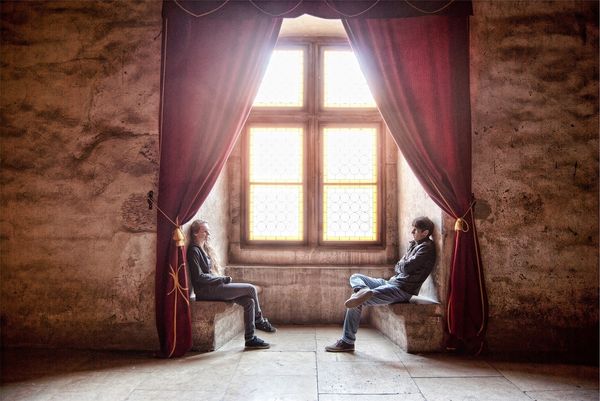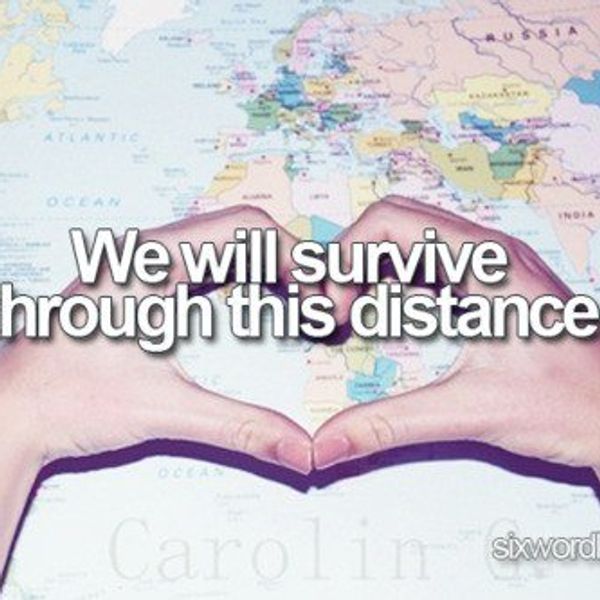Your eyes meet across the table. It's your tradition- Sunday brunch with your man. As you drain another mimosa, you think about how lucky you are. You get to spend your early mornings, your late nights, your good times, your bad times, and your french fries with this special guy. You're so #blessed. Except you'd never say that. Because you're a straight man. You're the manliest of men. You exude heterosexuality. It's your god-given right to be romantically and sexually involved with women, and only women. Even though you're straight, and would never, ever, ever have sex with a man or sing Broadway numbers in public, you sure as hell can have your bromance. No homo, right?
But this isn't just about the bros. Ladies- you're guilty too. Hello, straight people. We need to have a little chat about heteronormativity. Particularly, heteronormativity in regards to same-sex ties between people that define themselves as heterosexual. Let me break it down for you, advertisement-about-medication-on-TV style. Do you identify as 'straight'? Do you have friends? Are some of these friends similarly 'straight' and of the same gender identity? Do you engage in close emotional bonds with any of these individuals that would be characteristic of romantic or sexual interest if they were formed with you and a member of the sex you're attracted to?
If you answered yes to all of these questions (really hope you said yes to the second one, but here's some help if you aren't so lucky), congratulations! You probably have one of those confusing 21st-century relationships with characteristically wishy-washy boundaries that eliminate the parties from distinction as being partners. I'll use an example from my own life to show exactly how these relationships might not be as harmless as they seem- in fact, they can be seen as remnants of a social past that is unwilling to accept deviancy from heterosexuality.
There's a very important girl in my life. Her name is Victoria. We go on dates, call each other babe, say 'I love you' a lot, talk about dating (each other), talk about getting married (to each other), cuddle, sleep over at each other's apartments, make each other dinner, and take care of the other when they're sick, under-caffeinated, or need attention. She traveled over 3,500 miles to visit me on modest intern wages. I spent Thanksgiving and Easter with her and her family. I think her dog even likes me a little bit.
Victoria and I are not dating. Victoria and I are not romantically or sexually involved.
But you're not surprised by that.
My goal is to show you why you're not.
Socially, the normalcy of these relationships has several causes. On a basal level, the fact that I communicated a close same-sex friendship between women can be seen as more common because women are socially perceived as being more affectionate and openly emotional. In addition, the Western historical basis of men as occupants of the public sphere and women as occupants of the private sphere has made homosexuality between men something that has had more exposure and stigma than homosexuality between women. In addition, non-penetrative sexual acts were viewed as illegitimate for extensive periods of time. Basically, there's an entire history of misogynistic undertones implying that women were, by nature, some combination of asexual and baby-crazed (basically, they would only desire procreative sex, because of their motherly nature). Female pleasure wasn't really an issue, so if two women felt like getting a little same-sex action in, nobody really cared. In some regards, female same-sex interaction was seen as non-threatening to heterosexual relationships because it was just seen as a stepping stone to a long life of procreative, marital bliss.
I'm including this little history lesson because history is cool.
Also, this is a clear precursor to modern sexuality. Female sexuality is seen as inherently more fluid- i.e., awful straight boys will tell lesbians they can 'change them', while this is less common with straight women towards gay men, men often fantasize about threesomes with two women, sexual activity such as touching or kissing between women is seen as erotic for both men and women, while sexual activity between two men isn't commonly arousing to straight men and women (or, is less socially accepted as such). In effect, with women, the possibility of a heterosexual relationship is never completely ruled out from a social perspective.
I will briefly take a moment to celebrate the fact that I used the word 'erotic' in a pseudo-professional setting.
Anyways, let's get back to the bromances. That's what we're all here for.
Essentially, the social sexual dichotomy of men and women might imply that the emotional friendships I'm discussing would only occur between women. In fact, disparate sexual norms simply cement these friendships in a place that is strictly nonsexual. Because men are socially portrayed as more sexually rigid, a heterosexual man's friendships are seen as unquestionable in nature- thus, a bromance is a bromance, not a romance, because an actual romance between two bros is an impossibility.
For women, there is more freedom for emotional intimacy within the label of heterosexuality, because heterosexuality for women is intrinsically more flexible. If I make out with my friend at a party, I'm still seen as straight. If I hold hands with a girl, I'm still seen as straight. If I offhandedly tell a girl I love her, I'm still seen as straight. The reality of the situation may or may not align with social perception, but there is a distinct difference between markers of homosexuality between men and women. If a man performs any of the actions I described above with another man, his sexuality would be questioned. If a man was seen kissing another man at a party, he would immediately be labeled as gay or bisexual.
And now, my little chickadees, I'm finally getting around to what I meant to say. When we joke about the seemingly homosexual characteristics of our same-sex friendships, we're simply deepening the groove of heteronormativity in modern society- a groove, mind you, that's already Mariana Trench-like in nature. By laughing off your close female friend as your 'lesbian lover or discounting your man buddy as a 'bromance', you're unintentionally supporting the idea that genuine same- sex relationships are improbable. In some regards, it lends social confusion to homosexuality as a concept- if two women being really intimate friends is more palatable and common than two women being partners, it can be difficult for outsiders to recognize and respect homosexual relationships as legitimate.
In addition, these relationships are the embodiment of the flexibility and freedom that straight men and women have. I am seen as a heterosexual woman, so I can freely flirt with other women in a non-threatening way. If I were gay or bisexual, I would not have these freedoms. The same applies to men- straight men can have bromances, but bisexual or gay men are limited in their interactions with other men if they don't wish to project the appearance of attraction. Heterosexuality comes with a range of flexibility and privilege, and these close friendships are prime exhibits of this phenomenon.
When drafting this article, my roommate asked me why I chose to focus on same-sex emotional bonds between heterosexual individuals instead of different-sex emotional bonds. And, the reality is, any jokes about dating or marriage between such individuals are often thinly veiled interpretations of possibility. Take, for example, "When Harry Met Sally," a film well known for its iconic orgasm scene, but an indication that men and women couldn't be friends because of sexual tension. The fact that the characters in the film end up together implies that the social expectation is that emotional bonds between men and women must be manifested sexually or romantically. One of my best childhood friends was a boy, and everyone still makes jokes that we're going to get married, despite an absolute lack of interest in that possibility from either party. While platonic friendships between girls and boys are real, important, and wonderful, the social expectation is that there is some degree of attraction.
Social norms change considerably in a short amount of time, but the roots of the things we believe are deep. Unless we observe why some behavior is acceptable for some individuals and prohibited by others, we'll never be able to truly eradicate the misconception and confusion that prevents us from understanding others. I encourage you to embrace the relationships that you have. I am, in no way, criticizing or belittling the way you feel about your same-sex emotional bonds. I am, however, giving a warning that the way in which you exhibit or define these relationships can simply keep undesirable social ideas in place. All interactions have power and meaning, and should be treated that way.
Brunch, on bros. But talk about heteronormativity over mimosas next time.





















